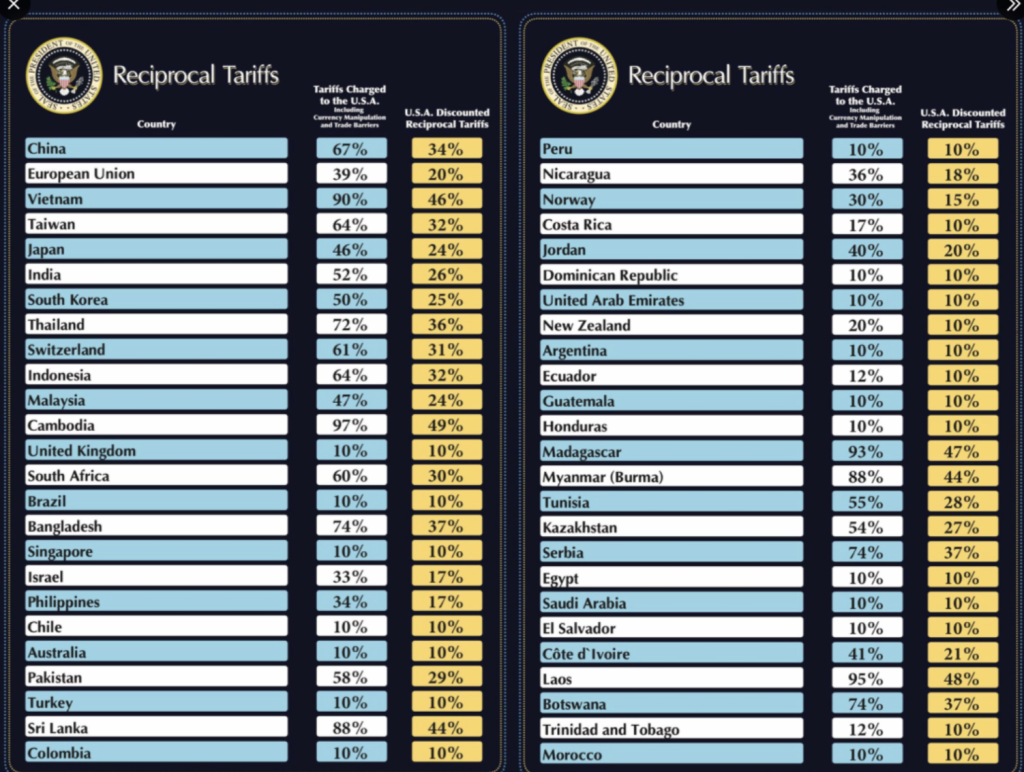Government/Policy
April 2, 2025
Trump's 'Liberation Day' brings 10% baseline tariffs; steel, aluminum, and autos/parts excluded
Written by Ethan Bernard
President Trump’s promised “Liberation Day” has arrived, with a 10% minimum tariff on imports.
But there are some very important exceptions: The United States’ USMCA partners, Canada and Mexico, are excluded from the reciprocal tariffs for now.
In addition, steel, aluminum, as well as autos and auto parts are excluded from the reciprocal tariffs. That’s because they are already subject to Section 232 tariffs, according to a fact sheet released by the White House on Wednesday evening.
Timelines and tariff amounts
The 10% rate on imports from all countries outside North America is set take effect on April 5 at 12:01 a.m. ET.
Additionally, the Trump administration will place higher, individualized reciprocal tariffs on countries with which it says the US has the largest trade deficits. (A list of those tariff rates is below.)
The higher tariffs are set to be enacted on April 9 at 12:01 a.m. ET. This could give those countries time to negotiate a lower rate.
The baseline 10% was received by traditional allies such as Australia and the UK. Other countries receiving the lower tariff included Argentina, Brazil, Egypt, Saudi Arabia, and the United Arab Emirates (UAE).
China, often a target of US trade actions, was hit with a rate of 34%. Southeast Asian nations – including Vietnam (46%) and Indonesia (32%) – were also clobbered. Meanwhile, other traditional US allies – including the European Union (20%), Japan (25%), and Taiwan (32%) – received substantially higher rates than the baseline 10%.
“These tariffs will remain in effect until such a time as President Trump determines that the threat posed by the trade deficit and underlying nonreciprocal treatment is satisfied, resolved, or mitigated,” the fact sheet said.
In other words, no timeline for removing the tariffs was provided.
Justification
In the executive order announcing the reciprocal tariffs, Trump said the unfair trade practices from both allies and enemies constitute a threat to national security.
“That threat has its source in whole or substantial part outside the United States in the domestic economic policies of key trading partners and structural imbalances in the global trading system,” Trump said. “I hereby declare a national emergency with respect to this threat.”
Exclusions
Canada and Mexico were excluded from the reciprocal tariffs. But they are are still subject to Section 232 tariffs of 25% on steel, aluminum, automobiles, and automobile parts.
Also, Canada and Mexico continue to face tariffs under the International Emergency Economic Powers Act (IEEPA) for alleged failure to control migration and trafficking of fentanyl.
Under IEEPA orders, USMCA-compliant goods face no tariff. But non-USMCA compliant goods face a 25% tariff. And non-USMCA compliant energy and potash, a key ingredient in fertilizer, are subject to a 10% tariff.
If the Trump administration ended the IEEPA orders, USMCA compliant goods would continue to face no tariff. Non-compliant goods would be subject to a 12% reciprocal tariff.
Background
Recall that a 25% tariff on all cars and trucks not made in the US is set to take effect on April 3 at 12:01 a.m. ET. The 25% tariff on parts will go into effect on May 3.
Undiluted Section 232 tariffs of 25% on steel and aluminum imports came into effect as of March 12.
Reciprocal Tariffs released by White House








